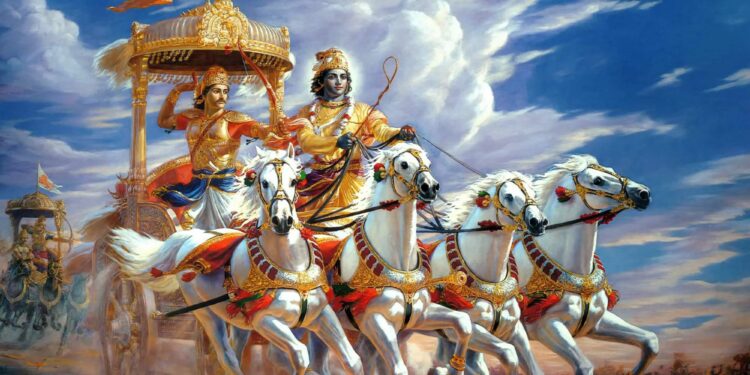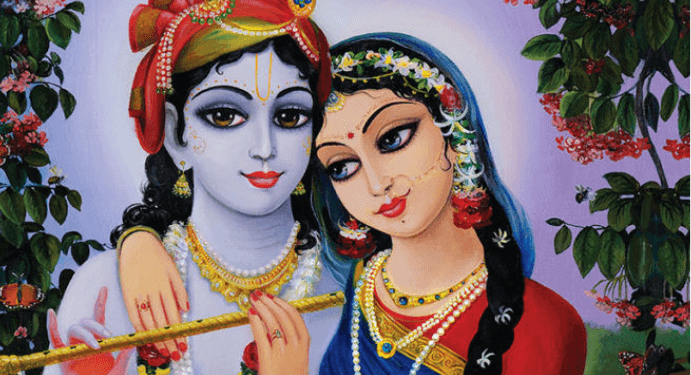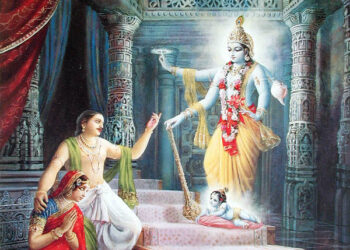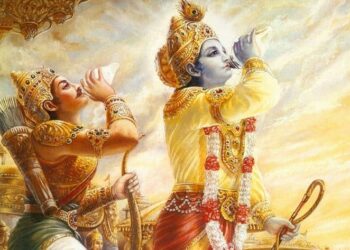How Can We Remember Sri Krishna?
He does not advise Arjuna simply to remember Him and give up his occupation. No, the Lord never suggests anything impractical. In this material world, in order to maintain the body one has to work. Human society is divided, according to work, into four divisions of social order—brāhmaṇa, kṣatriya, vaiśya and śūdra. The brāhmaṇa class or intelligent class is working in one way, the kṣatriya or administrative class is working in another way, and the mercantile class and the laborers are all tending to their specific duties. In the human society, whether one is a laborer, merchant, administrator or farmer, or even if one belongs to the highest class and is a literary man, a scientist or a theologian, he has to work in order to maintain his existence. The Lord therefore tells Arjuna that he need not give up his occupation, but while he is engaged in his occupation he should remember Kṛṣṇa (mām anusmara [Bg. 8.7]). If he doesn’t practice remembering Kṛṣṇa while he is struggling for existence, then it will not be possible for him to remember Kṛṣṇa at the time of death. Lord Caitanya also advises this. He says, kīrtanīyaḥ sadā hariḥ: [Cc. Ādi 17.31] one should practice chanting the names of the Lord always. The names of the Lord and the Lord are nondifferent. So Lord Kṛṣṇa’s instructions to Arjuna to “remember Me” and Lord Caitanya’s injunction to “always chant the names of Lord Kṛṣṇa” are the same instruction. There is no difference, because Kṛṣṇa and Kṛṣṇa’s name are nondifferent. In the absolute status there is no difference between reference and referent. Therefore we have to practice remembering the Lord always, twenty-four hours a day, by chanting His names and molding our life’s activities in such a way that we can remember Him always.
How is this possible? The ācāryas give the following example. If a married woman is attached to another man, or if a man has an attachment for a woman other than his wife, then the attachment is to be considered very strong. One with such an attachment is always thinking of the loved one. The wife who is thinking of her lover is always thinking of meeting him, even while she is carrying out her household chores. In fact, she carries out her household work even more carefully so her husband will not suspect her attachment. Similarly, we should always remember the supreme lover, Śrī Kṛṣṇa, and at the same time perform our material duties very nicely. A strong sense of love is required here. If we have a strong sense of love for the Supreme Lord, then we can discharge our duty and at the same time remember Him. But we have to develop that sense of love. Arjuna, for instance, was always thinking of Kṛṣṇa; he was the constant companion of Kṛṣṇa, and at the same time he was a warrior. Kṛṣṇa did not advise him to give up fighting and go to the forest to meditate. When Lord Kṛṣṇa delineates the yoga system to Arjuna, Arjuna says that the practice of this system is not possible for him.
arjuna uvāca
yo ‘yaṁ yogas tvayā proktaḥ
sāmyena madhusūdana
etasyāhaṁ na paśyāmi
cañcalatvāt sthitiṁ sthirām
“Arjuna said: O Madhusūdana, the system of yoga which You have summarized appears impractical and unendurable to me, for the mind is restless and unsteady.” (Bg. 6.33)
But the Lord says:
yoginām api sarveṣāṁ
mad-gatenāntarātmanā
śraddhāvān bhajate yo māṁ
sa me yuktatamo mataḥ
“Of all yogīs, the one with great faith who always abides in Me, thinks of Me within himself, and renders transcendental loving service to Me is the most intimately united with Me in yoga and is the highest of all. That is My opinion.” (Bg. 6.47) So one who thinks of the Supreme Lord always is the greatest yogī, the supermost jñānī, and the greatest devotee at the same time. The Lord further tells Arjuna that as a kṣatriya he cannot give up his fighting, but if Arjuna fights remembering Kṛṣṇa, then he will be able to remember Kṛṣṇa at the time of death. But one must be completely surrendered in the transcendental loving service of the Lord.



















